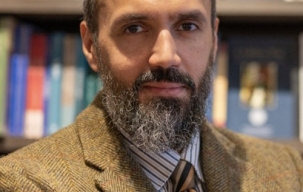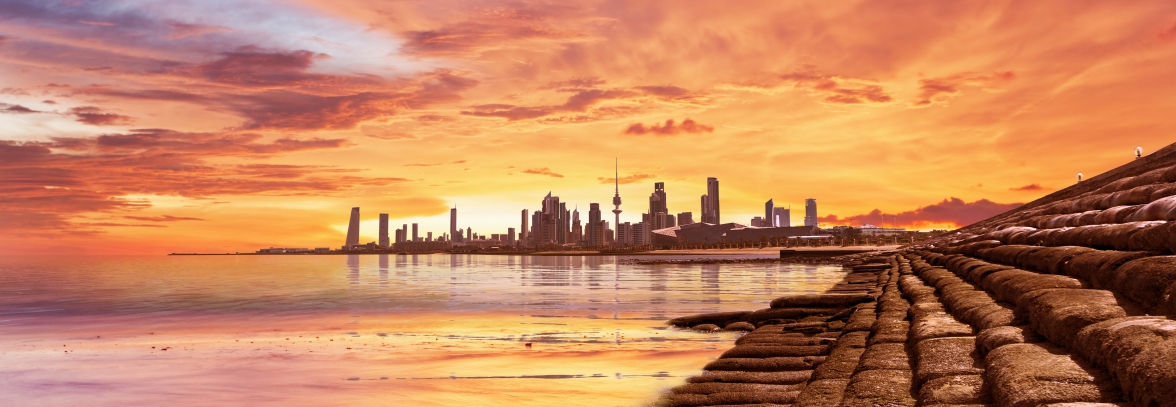Key dates
Latest
-
PodcastsDefence & Security — 27 Feb 2025
MENA under a Trump Presidency - What next? with Dr. H.A. Hellyer
 Members content
Members content -


Kuwait City
4.2 million
Constitutional monarchy
The Emir, Sheikh Nawaf al-Ahmad al-Sabah
Prime Minister Sheikh Ahmad Nawaf Al-Ahmad Al-Sabah
February 25th
H.E. Bader A. Almunayekh *
(*Replaced H.E Bader Mohammed Alawadi in December 2024)
Embassy of Kuwait, 2 Albert Gate, London, SW1X 7JL
H.E Ms Belinda Lewis
British Embassy Kuwait, Arabian Gulf Street, Dasman, Kuwait City, Kuwait
A young and diverse population
Kuwait is an ethnically diverse country, like many of its wealthy Gulf neighbours, and hosts a large number of migrant workers. Roughly 30% of citizens are Kuwaiti, 27% Arab, 40.3% Asian, 1% African and the remaining approximately 9% designated as "other".
The average age of a Kuwaiti citizen is roughly 30 years old. The country’s population is growing at an annual rate of 1.27%. The life expectancy of a Kuwaiti is 78.6 years.
Government
There are six governates in Kuwait: Al Ahmadi, Al ‘Asimah, Al Farwaniyah, Al Jahra’, Hawali, and Mubarak al Kabir. The Kuwaiti consititution was adopted in 1962. Kuwait’s legal sytem is a mixture of English, French and Sharia law.
Kuwait’s executive branch is headed by the Emir, who is head of state and Commander of the country's armed forces. The head of the government is a prime minister who leads a cabinet. The first 5 Emirs of an independent Kuwait also held the position of prime minister but since 2006 the job has been done by experienced politicians and diplomats.
The Emir is chosen within the royal family and then confirmed by the National Assembly. The Prime Minister and deputy are appointed by the Emir. Crown princes are appointed by the Emir, and then are approved by the National Assembly.
Kuwait’s legislative branch is the National Assembly contains a total of 66 seats. 50 of these seats are directly elected by simple majority. The remaining 16 are members appointed by the Emir. The National Assembly was established two years after independence.
Kuwaiti politics
Kuwait does not recognise political parties as such, but, nevertheless, recognisable political factions have emerged. This includes the Shaabi, a coalition of Sunni and Shia populists, the Islamist faction, which again includes Sunni and Shia members as well as a liberal secular bloc. The elections of May 2009 saw women voted onto the National Assembly. Four women won seats, just 3 years after getting the vote.
In the early 2010s, politicians became more assertive and this led to friction on a number of issues, particularly over proposed changes to electoral law, between the government and the National Assembly.
History
The modern state of Kuwait owes much to Sheikh Mubarak al-Sabah al-Sabah, better known as Mubarak the Great, who, in 1899, signed a security agreement with Britain. The treaty obliged the Royal Navy to protect his land from the diverse threats that existed in the region, notably from piracy and increased Ottoman interference.
As it entered the 20th century, Kuwait developed its territory and continued to defend it from various putative rulers on the Arabian Peninsula that were busy forming their own states. This included Abdulaziz bin Abdul Rahman al-Saud, the founder and future first king of Saudi Arabia who believed that Kuwait should be a part of his new kingdom. Britain was eventually able to broker peace but not without Kuwait losing two-thirds of its territory to al-Saud.
Discovery of oil
In the 1930s, Kuwait discovered its huge oil reserves conveniently at a time when it, along with many of its Gulf counterparts, including Bahrain and Qatar, were trying to cope with the decline of the pearling industry. The huge economic benefit of these oil reserves transformed all aspects of Kuwaiti society. Despite its economic development, geopolitics was never going to give Kuwait an easy ride.
Iraq and war
After independence from Britain in June 1961, Iraq immediately claimed Kuwait as part of its territory and threatened annexation, a sign of foreboding of future conflicts in the region. The then Iraqi president, General Abd al-Karim Qasim, claimed that Kuwait had been part of the Ottoman Vilayet of Basra and was therefore ultimately a part of Iraq.
Shortly after Kuwait became independent, British prime minister, Harold Macmillan, sent thousands of troops to Kuwait to ward off any threat of invasion (Operation Vantage). Later that same July, Kuwait formally entered the Arab League as an independent country.
Invasion by Iraq
On August 2nd 1990, Saddam Hussein sent Iraqi tanks into Kuwait and onto Kuwait City following a dispute with the Kuwaitis, purportedly over oil production. It was an invasion that shocked the world. By midday on August 2nd, Iraq had occupied the entire country and had stationed its armour on the Kuwaiti border with Saudi Arabia. A week later Iraq announced its illegal annexation of Kuwait, the trigger for an international arms embargo on Iraq.
Months passed and when Iraq refused to leave Kuwait in the new year, Operation Desert Storm was launched, swiftly bringing about Iraq's ignominious retreat and defeat. A ground assault was launched against Iraqi troops in Kuwait in late February 1991, and Iraq was wholly ejected from Kuwait early the following month.
Economy
Kuwait’s GDP per capita stands at $65,800, the 15th highest globally. Kuwait is seeking to diversify its economy. This is being driven by the need to reduce its reliance on oil in the event of climate change and the need to de-carbonise economies. As well as its oil-related industries, Kuwait’s economy also relies on cement manufacture, shipping and food processing. Water desalinisation plants are also important employers, as is the case across the Arabian Peninsula.
New Kuwait Vision 2035
Kuwait is planning to invest its way out of dependency on oil. It has established the Fund for Future Generations to help prepare the country for a life after oil, a fund which was recently estimated at $700 billion. Like Saudi Arabia, Kuwait has its own strategic vision - Vision 2035- and also like Saudi Arabia, Kuwait is also investing heavily in the creation of its own "smart city" from scratch. South Saad Al Abdullah city will cost an estimated $4billion to build and will eventually house 25,000 to 40,000 families.
New Kuwait Vision 2035 was launched in 2017 and is aimed at diversifying the economy in a number of ways, including transforming the country into a leading financial and commercial hub. Kuwait also hopes to forge a flushing tourism industry and three new hotels are already inn the pipeline.
The strategy is investing in the creation of new employment activities for Kuwaiti nationals, as well as upgrading infrastructure to diversify the economy and provide a sustainable living environment.

